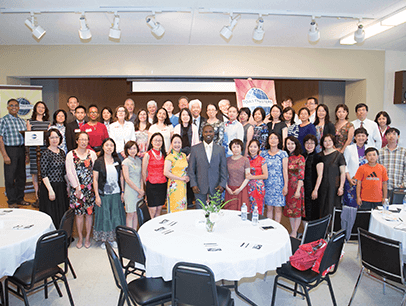Toastmasters clubs can be found in 144 countries, with members speaking dozens of languages. Most club meetings are conducted in a single national or regional language, but some clubs offer members the added challenge of bilingual meetings.
Bilingual or foreign language clubs are particularly successful in the borderless virtual environment. In fact, some were created to bring together people from different countries or regions. In other cases, bilingual clubs have formed for more practical reasons, such as career advancement.
The Pathways learning experience is translated into 11 languages, including English: Arabic, French, German, Japanese, Korean, Portuguese, Simplified Chinese, Spanish, Tamil, and Traditional Chinese. A new initiative, the District Translation Program, allows approved District teams to translate Pathways and other materials into native tongues not previously available, such as Hindi, Romanian, Swedish, Polish, and more.
Language is more than a communication tool. It reflects culture, history, geography, and identity. Global online clubs have given Toastmasters the opportunity to share languages and to cross borders without traveling. Here’s a look at some Toastmasters clubs that emphasize language, even if it’s not their own.

Dalian Japanese Toastmasters Club
Dalian is a port city in northeast China. Over the last couple of centuries, it was in turn governed by Japan, Russia, and Great Britain. That history influences Dalian even today, according to Heidi Liu, Division K Director for District 88.
“This city has a special culture because many years ago the Japanese came to China,” says Liu. “As a result of that, there are many Japanese speakers in Dalian.”
Dalian is a thriving center for international business, including the information technology (IT) industry. IT companies based in Japan with offices in Dalian include Wipro, Infosys, IBM, Dell, HP, Ericsson, Panasonic, Sony, Accenture, Oracle, Hitachi, and Cisco. Proficiency in Japanese is a plus for Chinese employees of these firms.
Dalian Japanese Toastmasters is a Japanese language club with an all-Chinese membership whose second language is English. Most of them work for Japanese technology firms and turned to Toastmasters to improve their communication skills at work.
“My Japanese is getting better and better,” says Club President Xuewei Zhang, whose job sometimes requires the ability to speak Japanese.
According to Vice President Membership Lloyd Dong, the club is especially beneficial because tech jobs like his limit the opportunities for extensive communication in Japanese.
“We don’t have a stage for public speaking. Most of our members work in the IT industry. In our daily life, we’re facing the computer. We’re coding, debugging, and programming, so we rarely make a speech to other people,” says Dong. The Toastmasters club gives members the opportunity to practice their Japanese for those moments when they step away from the computer.

Gemba Japanese English Bilingual Toastmasters Club
In Chennai, the capital of the south Indian state of Tamil Nadu, there is also a strong Japanese business presence. The Gemba Japanese English Bilingual Toastmasters Club, based in Chennai, was among the first in the city to take on the challenge of advancing fluency in Japanese. Their meetings are held in Japanese and in English, the latter being most members’ second language. Members strive to be proficient in Japanese but may use English if their Japanese is not yet fluent. The club touts the benefits of Toastmasters in learning conversational Japanese as an extension of their academic education in the language.
The former Club President and one of the founders, Karunanidhi Kasinathan, says the club is especially beneficial to college students and recent graduates preparing to enter the workforce.
“In India we have 3,000 Japanese companies and we have 20,000 students across India studying the Japanese language,” says Kasinathan. “We think that [Gemba] is a role model as a platform for these students to practice practical communication and conversation.”
Current Club President Jo Srinivasan sees the club as an opportunity for those students as well as workers who wish to pursue employment in India with Japanese businesses or by moving to Japan.
“There are five certificate level exams in Japanese language proficiency. These exams don’t test spoken Japanese,” says Srinivasan. “So, a student who is ready to go to Japan or who is interested in working in a Japanese firm may have a certificate, but when you ask them to converse with the Japanese there may be an issue.”

Amigos Toastmasters Club
Alejandro Martinez is originally from Spain. He moved to Copenhagen, Denmark, in 2018. There, he discovered Toastmasters and joined a local English-speaking club. In early 2019, a friend suggested they form a Spanish language club, which chartered as Amigos Toastmasters.
When the COVID pandemic began, the club turned virtual, enabling people living all over the world to join. The club had members from Mexico, Guatemala, Colombia, and Spain, but also counted natives of Romania, Portugal, Great Britain, and Canada in its membership.
One of them was Khalid Amin, DTM, from Manama, Bahrain. He attended college in Texas in the 1980s and learned some Spanish there, but despite being from a country whose national language is Arabic, he considers English his default language and hasn’t used Spanish much since living in the U.S.
When the pandemic started, Amin began searching for a virtual activity to keep him engaged and came across the Amigos Toastmasters club in Copenhagen. He joined the club in part to stay busy and in part to improve his Spanish. He is now fluent enough in Spanish to participate comfortably in club meetings.
“I was never fluent [before] but I was able to converse with people,” he says. “I was able to read and write but it was very basic.”
Even before he was proficient in writing and delivering prepared speeches in Spanish, the club benefited him during the isolation of the early days of the pandemic. He felt he was among friends, and that’s by design. Martinez says that the Amigos Toastmasters founders emphasized its positive and collegial atmosphere. A fellow club member encouraged this, pointing out that Amigos—Spanish for friends—should be true to its name. “He told me, ‘Alex, the purpose of this club should be to keep this atmosphere of friendship,’” says Martinez.
The club also extends that spirit to cultural exchange. They adopted a “country of the day” meeting theme, where the Toastmaster of the Day selects a country to highlight. They also shine a light on various special occasions, like Día de los Muertos (Day of the Dead), a holiday widely celebrated in Mexico.

Airoli Bilingual Toastmasters Club
India is a truly multilingual country. According to the country’s 2011 census, 26% of Indian residents are bilingual and 7% are trilingual. Hindi is the most widely spoken and is the first language of more than 40% of Indians and the official language of nine Indian states.
The Airoli Bilingual Toastmasters Club, chartered in 2020 in the western Indian city of Mumbai, meets twice a month and alternates meetings in Hindi and English. The club’s goal was and is to help members increase their fluency in Hindi. The official language there is Marathi, although as in most of India, people in that region speak more than one language. But not all of them are fluent in Hindi.
“The purpose of Toastmasters is to help people build confidence in speaking in front of others, and it can be in any language they want.”
—Sapna Ohri, DTMSapna Ohri, DTM, a charter member and the club’s current Sergeant at Arms, was in that position. She is originally from the northern state of Punjab and her mother tongue is Punjabi, although she spoke some Hindi. When she moved to Mumbai, she began speaking primarily English, as her job requires. When the Airoli Bilingual club was formed, its District comprised seven Indian states with multiple languages, and the club offered the opportunity to polish the country’s most-spoken language, Hindi.
“I believe that public speaking should not be limited to only one language,” says Ohri. “The purpose of Toastmasters is to help people build confidence in speaking in front of others, and it can be in any language they want.”

Tokyo Hangul Toastmasters Club
You can fly over the Sea of Japan from Seoul to Tokyo in a little over two and a half hours. Despite their geographic proximity, South Korea and Japan have at times had strained relations. Over the years, stereotypes and misunderstandings have been circulated. The Tokyo Hangul Toastmasters Club, based in Yochiyo, a town near Tokyo, was founded in an effort to overcome such misunderstandings.
Trent Taeryeon Jung, DTM, a resident of Seoul, South Korea, lived and worked in Tokyo for several years. While there, he joined a Japanese-speaking Toastmasters club and on returning to Seoul, reached out to his friends in Tokyo about forming a Japanese and Korean language club. The club chartered in 2020 and meets once a month, devoting one hour to Korean and one to Japanese.
“In Japan I met so many nice people and when I came back to Korea, I wanted to become a bridge between the two countries,” says Jung. “Unfortunately, as in many places, there are people who do not like other countries because of misunderstanding and prejudice.”
One of the best ways he could envision doing this was through Toastmasters. Club members not only improve their Korean and Japanese language fluency they also polish their public speaking skills. And in the spirit of brotherhood the club was formed to encourage, they also have cultural exchanges at meetings, focusing on areas such as food, travel, or celebrations.
“In Japan I met so many nice people and when I came back to Korea, I wanted to become a bridge between the two countries.”
—Trent Taeryeon Jung, DTM“A Japanese person introduces Korean culture in Japanese, and Koreans introduce Japanese culture in Korean,” says Club Secretary Yoshiko Sugita, who lives in Utsunomitya, Japan. “For example, some speeches focused on Korean railways in the travelogue section and Japanese obento in the food culture section.”
Meetings have taken place in both Tokyo and Seoul, and always in the spirit of forging bonds and friendships.
“We come together to celebrate the brotherhood between the two groups,” says Jong. “This kind of cultural exchange is, I think, a unique and fantastic thing.”
Are you ready to learn a new language or thinking of joining a bilingual club? In this video, speaker and entrepreneur Carol Bausor shares her tricks to learning a foreign language.
Ruth Nasrullah is a freelance journalist based in Houston. She joined Toastmasters in 2006 and since then has belonged to several clubs in the greater Houston area. Visit ruthnasrullah.com to learn more about her and her writing.
Related Articles

Communication
7 Tips to Attend a Bilingual Toastmasters Meeting

Club Experience
Two Ways to Say It

Communication





